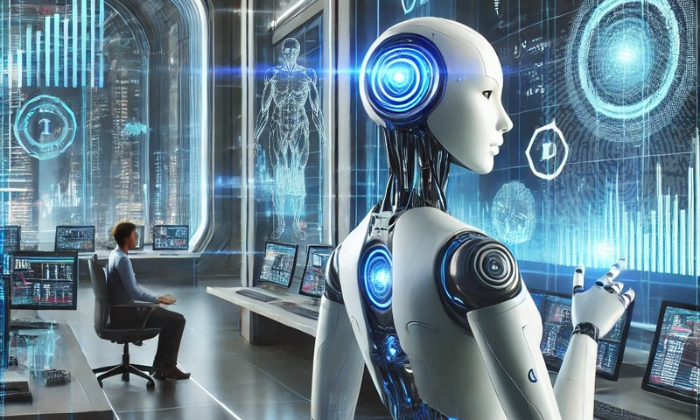The Role of AI in Human Development (Human Tariqa) and Technological Advancement
Introduction

People often wonder, Will AI take my job? Is AI dangerous? How does AI impact daily life? These are some of the most searched questions on Google, yet the answers are often unclear.
Technology has always driven human development (human tariqa), with artificial intelligence (AI) now playing a crucial role in shaping industries, automating tasks, and enhancing decision-making. But what does AI truly mean for human progress? This blog explores AI’s real impact, its benefits and challenges, and what the future holds for humanity.
What is AI and Why Does It Matter?
AI is the ability of machines to mimic human intelligence—learning, problem-solving, and decision-making. But the real question is: Can AI think like a human?
Types of AI:
- Narrow AI: Used for specific tasks (e.g., chatbots, self-driving cars, recommendation systems).
- General AI: capable of performing diverse tasks like a human.
- Super AI: A theoretical AI that surpasses human intelligence.
The development of AI directly impacts human progress (human tariqa) by solving problems once considered impossible.
AI’s Impact on Everyday Life (Things You Didn’t Realize!)
1. Healthcare (Will AI Replace Doctors?)
AI is diagnosing diseases with higher accuracy than humans, predicting health risks, and even assisting in surgeries. But does this mean doctors will become obsolete? No! Instead, AI is helping doctors make faster, more accurate decisions, improving patient outcomes, and extending human life.
2. Finance (Can AI Help Me Make Money?)
AI-driven trading algorithms, fraud detection systems, and robo-advisors help people invest wisely and save money. Instead of replacing financial professionals, AI is making financial decisions smarter and more accessible.
3. Education (Can AI Replace Teachers?)
Personalized learning platforms powered by AI are helping students learn faster and in a way that suits them best. But AI won’t replace teachers—it’s simply a tool to enhance human learning.
4. Transportation (Will AI Make Driving Safer?)
Autonomous vehicles and smart traffic management are reducing accidents and improving efficiency. Instead of taking jobs, AI is making travel safer and faster.
5. Cybersecurity (Is My Data Really Safe?)
AI constantly monitors cyber threats, protecting sensitive information from hackers. But AI is also used by hackers, so cybersecurity experts are in high demand to counter these threats.
How AI Benefits Human Progress (Human Tariqa)
1. Will AI Take Over Jobs?
While AI automates repetitive tasks, it creates more jobs in AI development, robotics, and data science. Instead of fearing AI, people should focus on learning new skills to stay ahead.
2. Can AI Make Better Decisions Than Humans?
AI can analyze massive amounts of data in real-time, providing faster, data-driven decisions in healthcare, finance, and business.
3. Can AI Help Save the Environment?
AI optimizes energy consumption, predicts climate changes, and helps tackle global challenges like pollution and natural disasters.
The Future of AI and Human Development (What’s Next?)

People search for: Will AI ever be smarter than humans? The truth is, AI is a tool—it depends on how we use it. The future of AI includes:
- Better Human-AI Collaboration: AI will assist, not replace, humans.
- Advanced Healthcare Innovations: AI will predict diseases before symptoms even appear.
- AI for Global Solutions: AI will help solve poverty, climate change, and resource management issues.
- Stronger AI Ethics and Regulations: Ensuring AI remains fair, unbiased, and beneficial to society.
Conclusion
AI is not here to replace humans—it’s here to enhance human progress (human taraqqi). Instead of fearing AI, we should learn how to work with it, use it wisely, and ensure it benefits everyone. The key to success in the AI era is to stay informed, adapt, and evolve with technology. AI is not the enemy—it’s the next step in human evolution.











Post Comment